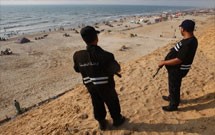 Militiamen surrounded the parliament building in Tripoli on Thursday, many arriving in heavily armed trucks, to protest newly elected Prime Minister Ali Zaydan's Cabinet selections. They objected on the grounds that the appointments include several members of Moammar Gadhafi's former regime. The action highlighted once more the challenges Libya faces in forming a government the country's fractious interest groups will accept.
Militiamen surrounded the parliament building in Tripoli on Thursday, many arriving in heavily armed trucks, to protest newly elected Prime Minister Ali Zaydan's Cabinet selections. They objected on the grounds that the appointments include several members of Moammar Gadhafi's former regime. The action highlighted once more the challenges Libya faces in forming a government the country's fractious interest groups will accept.
The protests took place soon after Libyan media reported that the General National Council had approved the selections, which provided appointees to six ministries, including the Interior Ministry. The Interior Ministry is especially important because it oversees the various government-funded militia groups -- known as the Supreme Security Committees -- in addition to internal security, the development of Libya's nascent police force and other domestic matters.
Libya is highly fragmented country, both due to its geography and to policies pursued by Gadhafi that favored Tripoli over other parts of the country. Since the transition from the revolutionary National Transitional Council to the popularly elected General National Council in August, the process of developing a national government has exposed Libya's internal fault lines. Regional power centers like Misurata and Benghazi are vying for authority after decades of suppression under Gadhafi's Tripoli-based regime, while the various militias that outnumber and outgun the anemic Libyan National Army have often succeeded in blocking government initiatives aimed at controlling their growing influence.
The continued absence of a strong, effective central government has created a vacuum of authority in much of the country. This has empowered not just the ordinary militias but also the more radical and jihadist elements that are hostile to members of the previous regime and to Western-backed moderates, many of whom currently serve in the General National Council.
Whatever its makeup, Zaydan's Cabinet will inevitably face the daunting task of trying to forge a national identity from several disparate, well-armed and competing factions. The shift toward democracy is guaranteed to be tentative and painful, and the consequences of the process will not be felt by Libyans alone.
Other states in the region -- namely Algeria, Mauritania and Niger -- are faced with a growing jihadist presence in northern Mali and apprehensions about a potential foreign intervention to oust them. Algeria is chief among the regional skeptics -- Algiers does not want Mali to contribute to the instability already on its border because of Libya. The weak central government in Tripoli and the large, poorly enforced Saharan border compound the difficulty of capturing orcontaining regional jihadists and organized criminal groups.
Given Washington's interest in eastern Libya, where a U.S. ambassador was killed in September, the United States is likely to get involved by covertly targeting the parties suspected of involvement in that incident. But while targeted operations against jihadists can prevent the regional threat from coalescing into a more serious security concern outside the region, Libyan stability is ultimately the responsibility of the Libyan state. As Thursday's incident outside the parliament building demonstrated, Libya is quite far from determining who, or what, will govern that state.